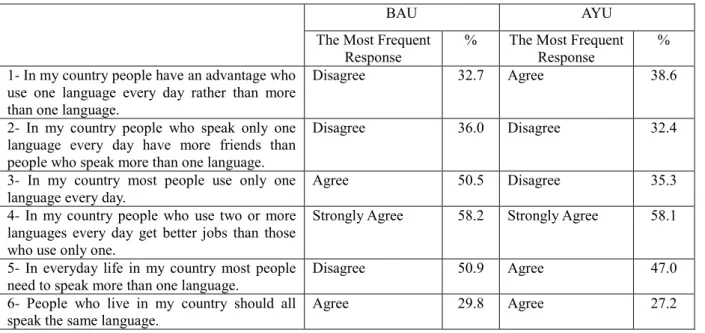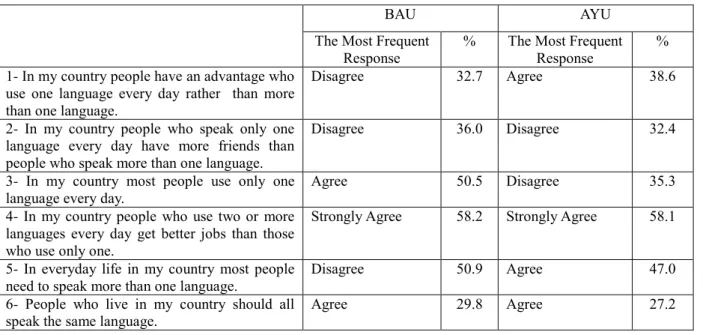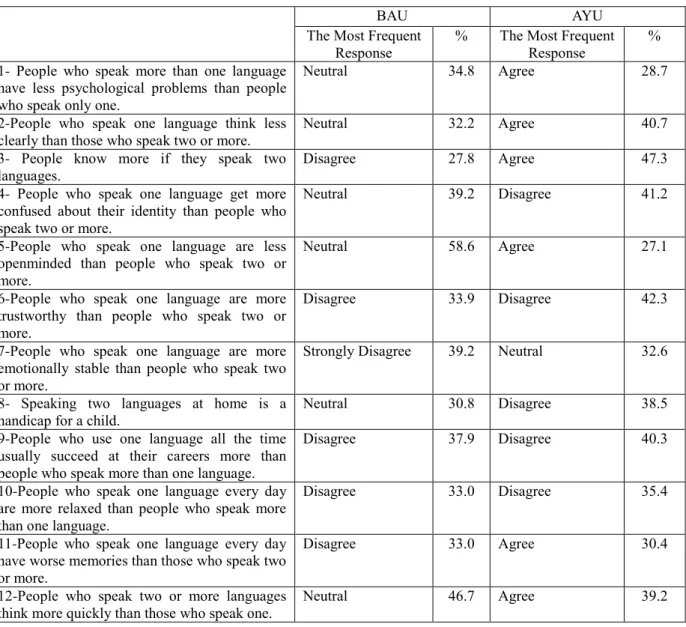MJLTM, 8 (7), 154-160.
Bilingualism and Comparison of the Attitudes of the Learners towards Foreign Language
Learning
Halil Küçükler Balıkesir University, Balıkesir – 38000, TurkeyARTICLE INFORMATION
Original Research Paper Received May. 2018 Accepted July. 2018 Keywords: Monolingualism Bilingualism Multilingualism FL Learning ABSTRACT
Bilingualism elicits debates on its importance or disadvantages. Opinions vary based on language orientation of people, their nationality and the perceived opinions. This research was done to look at the opinions of scholars on bilingualism. There are several dynamics that this research takes on. They include the Factual Feelings about Social bilingualism, Psychological Considerations and the personal considerations. The research was done by administering questionnaires to International Hoca Ahmet Yesevi University and Balıkesir University respondents. After the respondents made their contributions, the responses were analyzed and documented. A detailed discussion is given based on the compiled responses. The major conclusion of this research is that there is a positive attitude towards bilingualism among learners.
1. Introduction
Bilingualism is the ability of a person to speak in two languages, where one is normally a native language and the second is an acquired foreign language. There have always been varying attitudes about bilingualism among people. This is in regard to the benefits or the shortcomings that are associated with bilingualism. The opinions have varied based on the respondents that were asked about bilingualism. This paper presents a research that was done on Hoca Ahmet Yesevi international Turk-Kazakh University and first year Balıkesir University students between 2016-2017. The objective of the study was to determine the attitude of the learners towards bilingualism.
Theoretical background
Previous research has shown that to enhance integration in a country, there is a need to have a unified language that will be used by all people. This enhances integration among the various races in the country. As such, a national language is a symbol of unity in a country. Bilingualism undermines the development of a national language (Burnham & Pina (1990). This is because, people becomes more interested in the other nationality and pays little attention to their nationhood. Another research that was conducted by Hoover states that students that are bilingual have greater cognitive abilities than those students with only one language (Hoover, 1982). This includes the ability to use language as well as other abstract cognitive abilities. Greater cognitive ability according to Hoover is attributed to overcoming challenge in learning the second language. Another advantage of being bilingual that has been highlighted is that they are usually open-minded (Fernald, 2006).This means that
Modern Journal of Language Teaching Methods (MJLTM) ISSN: 2251-6204
MJLTM, 8 (7), 154-160.
they have an ability to look at issues from more than one dimension.
There are also many social opportunities for people who are bilingual (Ellinoora, 2016). This is because they can interact with many different people who belong to their first language and the second language that they have learnt.
Though there are many benefits of being bilingual, it must be noted that it is not easy to acquire a second language. People who are learning a second language usually lag behind for a short time behind other people, but they soon overtaken them. This is most common among children (Raguenaud, 2009). Though many researchers do applaud bilingual education, there are some challenges that face bilingual education. Some of the challenges include the lack of local support, limited application and lack of curriculum development learning institutions (Willig, 1985).
Research Methodology
This research was conducted through the use of questionnaires that were developed Cook. The questions covered three main areas that are influenced by bilingualism. These are social sphere, psychological sphere and personal spheres. The questions required that the students responded to questions on bilingualism. There are some general believes and postulates that exists about bilingualism. These postulates and general believes were used as the basis for the questions that were in the questionnaires. There were 350 prep-class students in Hoca Ahmet Yesevi international Turk-Kazakh University and first year Balıkesir University students who responded to the questions that were asked. Of the students that were interviewed, some were monolingual and some were bilingual students. Both the monolingual and bilingual students had varying attitudes about bilingualism. The responses that were given by the students were compiled into percentages and documented. The results gotten are documented in the results data sheet. A discussion of the results is presented.
General Factual Feelings about social bilingualism
Table 1: General Factual Feelings about social bilingualism
BAU AYU
The Most Frequent
Response % The Most Frequent Response % 1- In my country people have an advantage who
use one language every day rather than more than one language.
Disagree 32.7 Agree 38.6
2- In my country people who speak only one language every day have more friends than people who speak more than one language.
Disagree 36.0 Disagree 32.4
3- In my country most people use only one
language every day. Agree 50.5 Disagree 35.3
4- In my country people who use two or more languages every day get better jobs than those who use only one.
Strongly Agree 58.2 Strongly Agree 58.1
5- In everyday life in my country most people
need to speak more than one language. Disagree 50.9 Agree 47.0
6- People who live in my country should all
speak the same language. Agree 29.8 Agree 27.2
MJLTM, 8 (7), 154-160.
towards bilingualism is split based on who is the respondent. The reason is because, only some of the people speak a first and second language with the divide being an even split. Based on the results table above, there is an agreement about being some benefit in learning a second language. According to bilinguals and monolinguals, a country that has a bilingual population is more successful than a country with only one language. Success is a function of what the people do for their living and the economic resources that are available. The results also show that it is not necessary for all people to speak the same language. If a country has many language speakers, there is a creation of cultural diversity. Diversity of people also leads to diversity in social stratification and the consequences are economical in nature.
Similarity between the bilinguals and monolinguals opinions
Table 2: Similarity between the bilinguals and monolinguals opinions
BAU AYU
The Most Frequent
Response % The Most Frequent Response % 1- In my country people have an advantage who
use one language every day rather than more than one language.
Disagree 32.7 Agree 38.6
2- In my country people who speak only one language every day have more friends than people who speak more than one language.
Disagree 36.0 Disagree 32.4
3- In my country most people use only one
language every day. Agree 50.5 Disagree 35.3
4- In my country people who use two or more languages every day get better jobs than those who use only one.
Strongly Agree 58.2 Strongly Agree 58.1
5- In everyday life in my country most people
need to speak more than one language. Disagree 50.9 Agree 47.0
6- People who live in my country should all
speak the same language. Agree 29.8 Agree 27.2
There is an agreement between monolinguals and bilinguals about some of the benefits of being bilingual. In the study, both monolinguals and bilinguals stand a chance of being better in life if one is a bilingual and not a monolingual. One inherent factor is that bilinguals usually get better jobs than monolingual people. In the most prolific jobs, one is needed to be communicating with different stakeholders, some of whom have different languages. A second language is therefore normally a requirement. Sometimes, a second language is just an added advantage if two people are deemed to have the same qualifications. A bilingual person also has a larger variety of job options as opposed to a person who is monolingual. Opportunities could be domestic and could also be oversees for them. The other major finding is that there is not any benefit for all people to be speaking the same language. This is because, prosperity is normally found in diversity. The final similarity is that both monolinguals and bilinguals agree that it is not necessary that all people living in the same country have to speak the same language.
MJLTM, 8 (7), 154-160.
Psychological Considerations of Bilingualism
Table 3: Psychological Considerations of Bilingualism
BAU AYU
The Most Frequent
Response % The Most Frequent Response % 1- People who speak more than one language
have less psychological problems than people who speak only one.
Neutral 34.8 Agree 28.7
2-People who speak one language think less
clearly than those who speak two or more. Neutral 32.2 Agree 40.7
3- People know more if they speak two
languages. Disagree 27.8 Agree 47.3
4- People who speak one language get more confused about their identity than people who speak two or more.
Neutral 39.2 Disagree 41.2
5-People who speak one language are less openminded than people who speak two or more.
Neutral 58.6 Agree 27.1
6-People who speak one language are more trustworthy than people who speak two or more.
Disagree 33.9 Disagree 42.3
7-People who speak one language are more emotionally stable than people who speak two or more.
Strongly Disagree 39.2 Neutral 32.6
8- Speaking two languages at home is a handicap for a child.
Neutral 30.8 Disagree 38.5
9-People who use one language all the time usually succeed at their careers more than people who speak more than one language.
Disagree 37.9 Disagree 40.3
10-People who speak one language every day are more relaxed than people who speak more than one language.
Disagree 33.0 Disagree 35.4
11-People who speak one language every day have worse memories than those who speak two or more.
Disagree 33.0 Agree 30.4
12-People who speak two or more languages
think more quickly than those who speak one. Neutral 46.7 Agree 39.2
When it comes to psychological considerations, there is a general agreement in the opinions that are given by monolinguals and bilinguals. First, both sides do not think there is a relationship between language and psychological problems. An opinion on the same yields even statistics among all people. It is safe to say that psychological problems are independent of being monolingual or bilingual.
Communication clarity is not affected by the virtual of being monolingual or bilingual. Clarity in communication is a function of an individual’s masterly of language and subject matter. One can exhibit clarity in one language or multiple languages. One can also fail to do so in one language or in multiple languages as well.
When it comes to issues of virtue, there is no effect of a single language or a bilingual identity. Virtues like trust, politeness, patience, love and mercy are a function of a person’s personality and learning a second language or remaining with a single language has no influence on them. The same case applies to vices. A person will be rude, narcissist, evil or indecent based on their intrinsic value degradation and not as a function of language ability.
MJLTM, 8 (7), 154-160.
Emotional stability is another important psychological indicator. The emotional stability of a person is in no way linked with their first language, second or both. A person can only be fluent in one language and be psychologically stable or be psychologically unstable as well. The same case applies for people that are fluent in two languages.
The psychological effects of having two languages are also similar for children or for grownups. However, it must be noted that when children are taught a second language at an early age, they become more fluent by the time they are adults. The effect is that they become more confident when talking in their later lives than people who learn the language as adults and did not gain total fluency in the first language.
Gender comparison
Table 4: Gender comparison of statistical analysis
Grup N 𝐗̅ Sd 𝐒𝐞𝐗̅ t Test Diff.
t df p
General Factual Feelings about Social
Monolingualism F M 164 111 3,40 3,35 ,53 ,44 ,04 ,04 ,715 259,484 ,475 Psychological Considerations of
Monolingualism F M 164 111 3,11 2,98 ,75 ,68 ,06 ,06 1,429 271 ,154
Personal Feelings about
Monolingualism F M 164 111 3,64 3,44 ,46 ,54 ,04 ,05 3,286 271 ,001 F > M Opinions about second language
learning F M 164 111 3,23 3,14 ,63 ,54 ,05 ,05 1,290 271 ,198
Type of motivation F 164 4,21 ,59 ,05 1,943 271 ,053
M 111 4,06 ,69 ,07
Attitudes toward second language
learning F M 164 111 3,87 3,67 ,67 ,67 ,05 ,06 2,404 271 ,017 F > M
First, male and female subjects have almost the same statistics when it comes to bilingual education. There are as many women as men who have acquired a second language. Both men and women believe that there is a career benefit that comes with learning a second language. In process of learning a second language, both men and women faces the same apprehension in the learning process. The disparity between them comes when it comes to profiting from the second language. Women do profit more from second languages as compared to men. This is because; women are able to get involved in tertiary enterprises that need second language as opposed to men who seek more solid jobs. Most of the careers that deal with language are largely dominated by men. Women also have a more positive attitude towards bilingualism am opposed to me.
2.5. Personal Feelings about Bilingualism
Table 5: Personal Feelings about Bilingualism
BAU AYU
The Most Frequent
Response % The Most Frequent Response % 1- It is important for me to use my first
language well rather than to speak other languages.
Strongly Agree 40.8 Disagree 26.9
2- I will always feel more myself in my first
MJLTM, 8 (7), 154-160.
3- I would like to be considered a speaker of two languages rather than just a speaker of my first language.
Strongly Agree 39.3 Strongly Agree 68.6
4- I would feel more at home with people who speak two or more language than with people who speak only my first language.
Neutral 44.4 Agree 34.3
5- I would prefer to use one language every day rather than two or more.
Neutral 32.3 Disagree 42.9
6- I would be happier if I spoke one language
every day than if I spoke two or more. Neutral 32.7 Disagree 46.9
7- I would feel a less confident person if I spoke one language every day than if I spoke two or more.
Neutral 32.3 Disagree 35.4
3. Overall Discussion
The responses given by the two groups are based on either being bilingual or monolingual. This applies to the accrued benefits and the shortfalls of being bilingual. However, there are some opinions that are similar for both Yesewi University students and Turkish students.
Both Yesewi University students and Turkish students responded that they do not have any identity crisis that is inherent of their language orientation. Early conditioning is usually the source of identity and not language acquisition. Mastery of language may lead to identity crisis and this can happen to either a monolingual or a bilingual individual.
Yesewi University students believe that they are more knowledgeable than those students who are monolingual. Turkish university students also responded that they think that bilingual students are more knowledgeable. Empirically, Yesewi students are more exposed to greater variety of view point points and knowledge in the first language and the second language. Their judgements therefore more open minded as opposed to that of Turkish students.
From the research, it was conspicuous that the Yewesi students were more positive about their abilities than the Turkish students. For instance, the Turkish students thought that the bilingual students thought more clearly than them. Yewesi students also responded that they have more clear thought process owing to their bilingual orientation.
Another area is the memory capacity, where Yewesi students responded that they think that their memory capacity s greater than that of monolinguals. The Turkish students also believe that a person who has one language has a lower memory capacity than those with more than one language, which is empirically true. The consequence is that a person with more than one language is better at recalling than a person with only one language. A person with two languages is usually a quicker thinker than a person with only one language. People with two languages also exhibit greater mental strength and intelligence than the people with one language. (Burnham-Massey, & Pina, 1990) The reason for the above difference is because, learning a second language opens up the mind, increases its capacity and makes one to be able to process more through the use of the existing mental faculties.
4. Conclusion
MJLTM, 8 (7), 154-160.
monolingual. Both monolingual and bilingual students are positive towards bilingualism but the significant result of the study show that bilingual students gave more positive replies towards foreign language learning. Based on this research and the background knowledge that was investigated, it is beneficial to learn a second language. The benefits are manifested in the social sphere, the psychological sphere and also at a personal level.
References
Burnham-Massey, L., & Pina, M. (1990) Effects of bilingual instruction on English academic achievement of LEP students, Reading Improvement, 27(2), 129-132
Cook, V. (2001) VC’s Test of Monolingualism Mark III. Retrieved from: http://homepage.ntlworld.com/vivian.c/SLA/Attitudes.htm
Hoover, W. (1982). Language and literacy learning in bilingual education: Preliminary report. Cantonese site analytic study. Austin, TX: Southwest Educational Development Laboratory.
Willig, A. (1985), A meta-analysis of selected studies on the effectiveness of bilingual education; Review of Educational Research, 55, 269-316
Ellinoora T, 2016, The advantages and disadvantages of bilingualism: the story of two families, University of Jyväskylä
Raguenaud, V. (2009). Bilingual by choice: Raising kids in two (or more!) languages. Nicholas Brealey Pub: Boston.
Fernald, A. (2006). Childhood Bilingualism: Research on infancy through school age. Multilingual Matters: Clevedon



